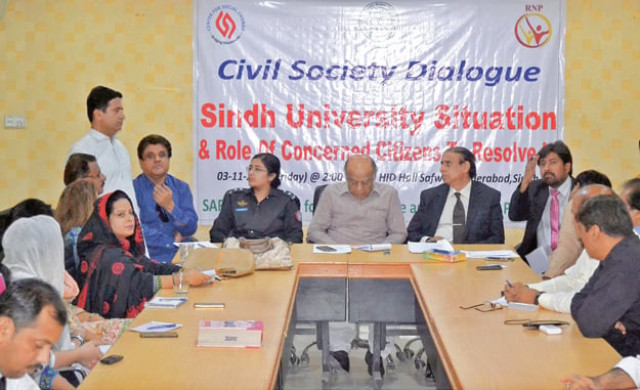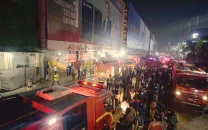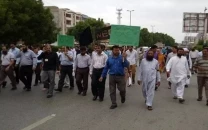Civil society arranges discussion to help resolve University of Sindh's issues
Moot discusses harassment, devastating effects of teacher's politics at SU

Intending to generate solutions through debate, some of the stakeholders sat across a table at a consultative dialogue on Friday to explain the problems of SU and suggest remedies for them. PHOTO: ONLINE
For SU, whose academic excellence has drawn less spotlight than regrettable controversies and incidents happening there intermittently, the year 2017 dawned with the mysterious death of a student, Naila Rind, at its hostel. The body of the female student found hanging from a ceiling fan in a hostel room illuminated the malaise afflicting many among more than 30,000 students, especially female, enrolled at the varsity.
Some other subsequent incidents - including the deaths of three other students in separate accidents around SU's premises and sexual harassment complaints - further underlined the administrative defects. A recent judicial report laid bare the poor state of facilities and security in the hostels which provide accommodation to around 1,600 female students.
Meanwhile, the officers have been fighting a case to oust teachers from the administration while the students' long time demand of revival of the unions remains unmet. Two groups of teachers are also known to be in a continual tug of war, which many argue has harmful flip sides for education as well as administration.
Judicial inquiry says condition of SU hostel worse than jail
Intending to generate solutions through debate, some of the stakeholders sat across a table at a consultative dialogue on Friday to explain the problems of SU and suggest remedies for them. The event was organised by Rights Now Pakistan and the Sindh Agricultural and Forestry Workers Coordinating Organisation.
"We are discussing the issues that aren't so desirable," pronounced Prof Dr Sarfaraz Hussain Solangi, SU's pro-vice-chancellor, while acknowledging civil society's initiative to help the varsity find solutions to its issues as a positive step.
Sexual harassment
Discussion of the issue of sexual harassment was one of the highlights at the event.
Although the participants agreed that harassment existed, many took exception to the public reaction in the media and social media, describing the reaction as harmful for higher education, SU, its teachers, students and parents. "The parents feel insecure," observed ASP Suhai Aijaz, who began investigation of the harassment complaints after the apex court took notice of them on October 24.
"I will request the people to assess negative impact of their posts [on social media] and [try to realise] how many people will be affected [by it]," ASP Aijaz said, adding that even if the three teachers, who are being investigated for the allegations, are found guilty, the whole varsity and its 700 faculty members could not be blamed for the offence.
However, ASP Aijaz asserted that a crime should not be left unpunished. "A female student shouldn't graduate [from SU] with negative experiences," she said.
GOC lauds SU students' paintings featuring armed forces' sacrifice
SU Teachers Association President Dr Azhar Ali Shah complained that three respectful faculty members were being dishonoured publicly because of a suspicious unsigned letter. "One of these teachers [Faraz Bughio of the Institute of English Language and Literature] has the credit of supervising the highest number of PhD [doctorate of philosophy] and MPhil [Master's of philosophy] students," he remarked.
Calling the charges against three teachers a conspiracy, Dr Shah said professional jealousy of an opponent teachers' group lay at the conspiracy's root. He pointed out that the SU has not still adopted the Higher Education Commission's (HEC) policy over harassment.
Zahida Detho, a rights activist, claimed that in one of her meetings with SU Vice-Chancellor Prof Dr Fateh Muhammad Burfat, the latter acknowledged that around 5% students face harassment. "Imagine the number of victims in a university with over 30,000 students." She bemoaned that even after a student's death, the HEC policy was not implemented.
Prof Solangi admitted that though the HEC policy had not been enforced, an anti-harassment committee did exist in the SU. The dialogue's recommendations called for the implementation of the policy by appointing a permanent harassment monitoring officer and a 10-member hearing panel consisting of teachers, students and non-teaching staff. They also suggested for maintaining strict confidentiality about the complainant and accused, taking measures to expedite complaint processing and giving the right to appeal to the accused.
SU teachers defamed by harassment charges
Student's suicide
Explaining the reason for filing a petition in the Naila Rind death case in the Sindh High Court, Advocate Ali Palh told the gathering that he suspected Rind was murdered. "Prior to her death, four separate incidents of women's suicides were reported in Tando Allahyar district but when further investigation was carried out [on court's order], the deaths surfaced as murders," he claimed.
Advocate Palh added that although the judicial inquiry was primarily to probe Rind's death, investigators also unearthed issues pertaining to harassment, hostel accommodation, transport and the university's governance.
Teachers' politics
"There is an element of ego in all groups of the teachers," asserted Khalid Meerani, the students welfare officer. "If someone from one group achieves a position of authority, the other reacts," he said. Prof Solangi admitted that since 2012, there has been a rancourous relationship between the groups of teachers due to unhealthy politics.
"The teachers' association has been destroying the SU. Only students should be allowed to form the unions," Detho said.
Govt to standardise VCs' appointment criterion
Recommendations
The participants asked the varsity administration to institute reforms in the examination systems by outsourcing the paper setting and paper checking so that teachers may not take advantage of their position. It was also proposed that thesis supervisors should also be selected from other varsities and SU teachers should be restricted to role of advisers in research assignments.
It was also demanded that the Sindh government should amend the existing Sindh Universities Law Amendment Act, 2013 and 2014, and restore autonomy of all public sector universities.
The other demands made in the gathering included restoration of students unions, annual performance evaluation of VCs and fixing age limit of 61 years for their appointment.



















COMMENTS
Comments are moderated and generally will be posted if they are on-topic and not abusive.
For more information, please see our Comments FAQ